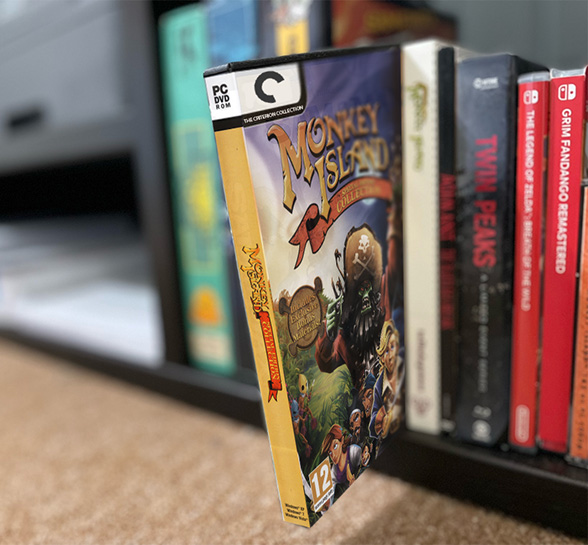Assisting Monkey lsland fans in obtaining and running uncompromised versions of the old games can feel like presenting them with an adventure game puzzle. Though fan preservation is invaluable, why in the name of Blackbeard's dandruff* should it always come to that?
If Mixnmojo has an uneasy relationship with the Monkey Island special editions, it has less to with any creative choices made in the adaptation (though believe me, we got opinions) than with what these revamps function as in effect: replacements for the original release versions.
“What about Classic Mode?” apologists well-intentioned readers might inquire. Well, it’s true: the toggle feature which lets you freely swap between new and old is downright brilliant, perhaps even the principal selling point of special editions, and rightly something Double Fine chose to ape when they subsequently developed "remasters" (less suggestive nomenclature, perhaps) of the Tim-led LucasArts adventures. But in the absence of offering legacy builds of these games, this feature only serves a preservation purpose if it stands as a faultless recreation (it does not) and if there was a single, definitive legacy version in the first place.
The latter factor weighs more heavily on The Secret of Monkey Island. “Classic Mode” in the special edition is a representation of the VGA CD version circa 1992. I don’t want to get into the weeds here about the various differences between the original EGA release, the VGA floppy version, and VGA CD (such dorkdom will be happily articulated upon request on the forums), but suffice it to say new audiences had a decision made for them about what the “original game” even was, and it’s not what shipped in October 1990.
In the case of Monkey Island 2, the overriding problem with Classic Mode is accuracy. Unfortunately, the issues there are myriad. The music implementation is compromised to say the least, though I'll need to tag in our resident expert Zaarin to elaborate:
For the MT-32 soundtrack, Land and co. created several custom instruments that the original PC version of the game would program into the MT-32 on-the-fly as needed via sysex messages. They also expanded the sound map for the percussion channel by doubling up some of the percussion effects so they could have one set without reverb and one with. The driver also reverts the panning on-the-fly as the MT-32 had a reversed panpot compared to most other MIDI devices.
Whoever recorded the music for the SE version ignored all of that. They recorded the raw MIDI files without transmitting any of the sysex messages necessary for proper playback and reverting the panning. The result is that all custom instruments are instead played by the default acoustic piano instrument, there's missing percussion, and the panning is backwards.
Beyond the soundtrack struggles, the original title sequence was outright eliminated from Classic Mode until bellyaching got it restored via patch. Gags based on ramping up the clock speed don’t seem to have been reproducible and are thus neutered – Guybrush now moves forward the spitting contest placement flags and nails Stan into the coffin at quite the leisurely pace. Rather than being grandfathered in, Classic Mode is subjected to the surprisingly numerous dialog changes found in the special edition presentation, mostly with regard to trademark references and the quoting of song lyrics – I’m guessing as a sort of autopilot policy to placate jittery attorneys. The highlighted dialog option screenshotted below is one of several examples:
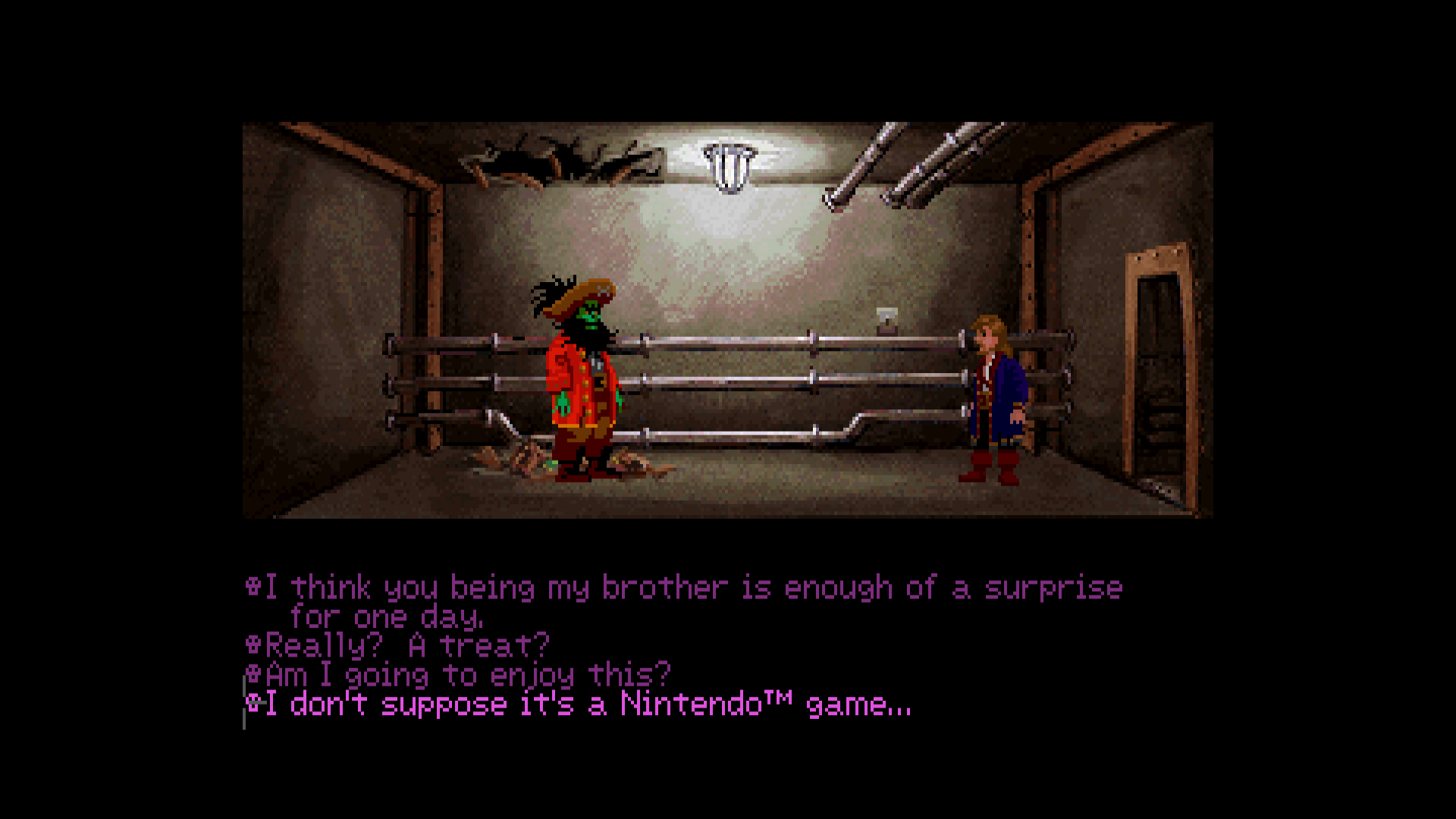
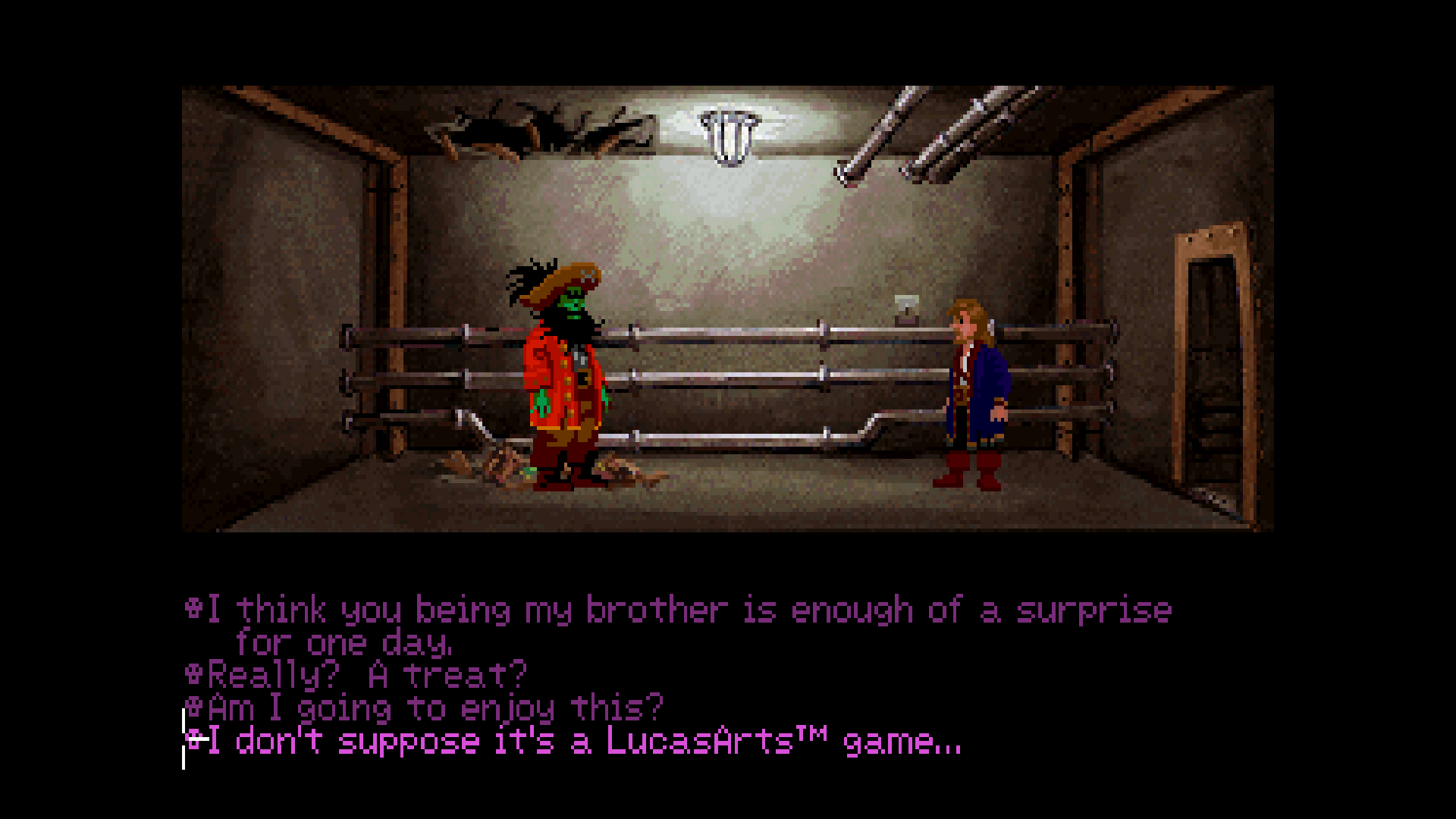
The script revision isn’t without some bowdlerization, free of charge. A remark about "midget wrestling" was targeted, a reference to going out for "a smoke" turns into "a swim," and in the game’s final scene, Guybrush’s mom had some eyebrow-raising words of caution for her boys deemed unfit for 2010 audiences:
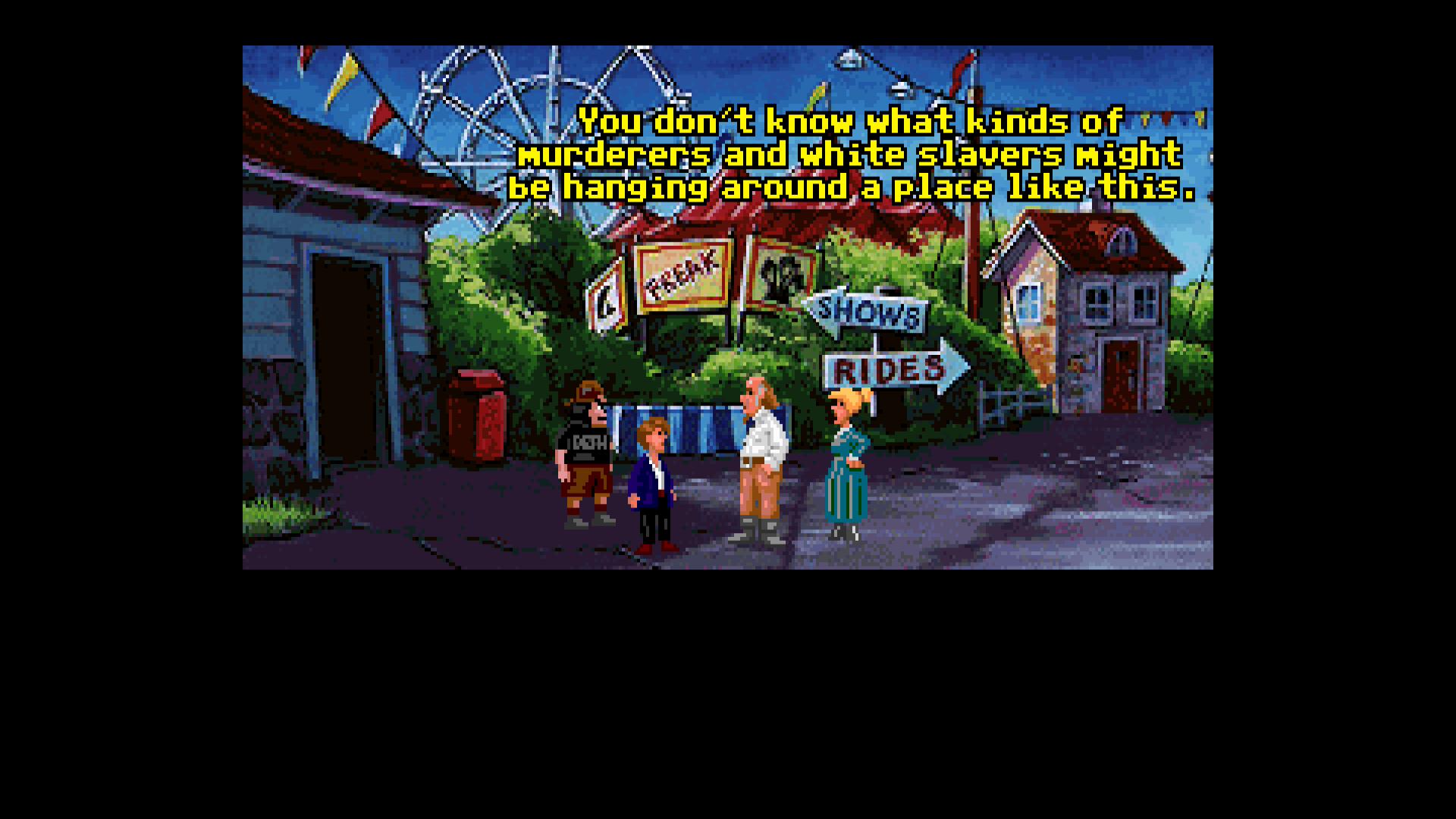
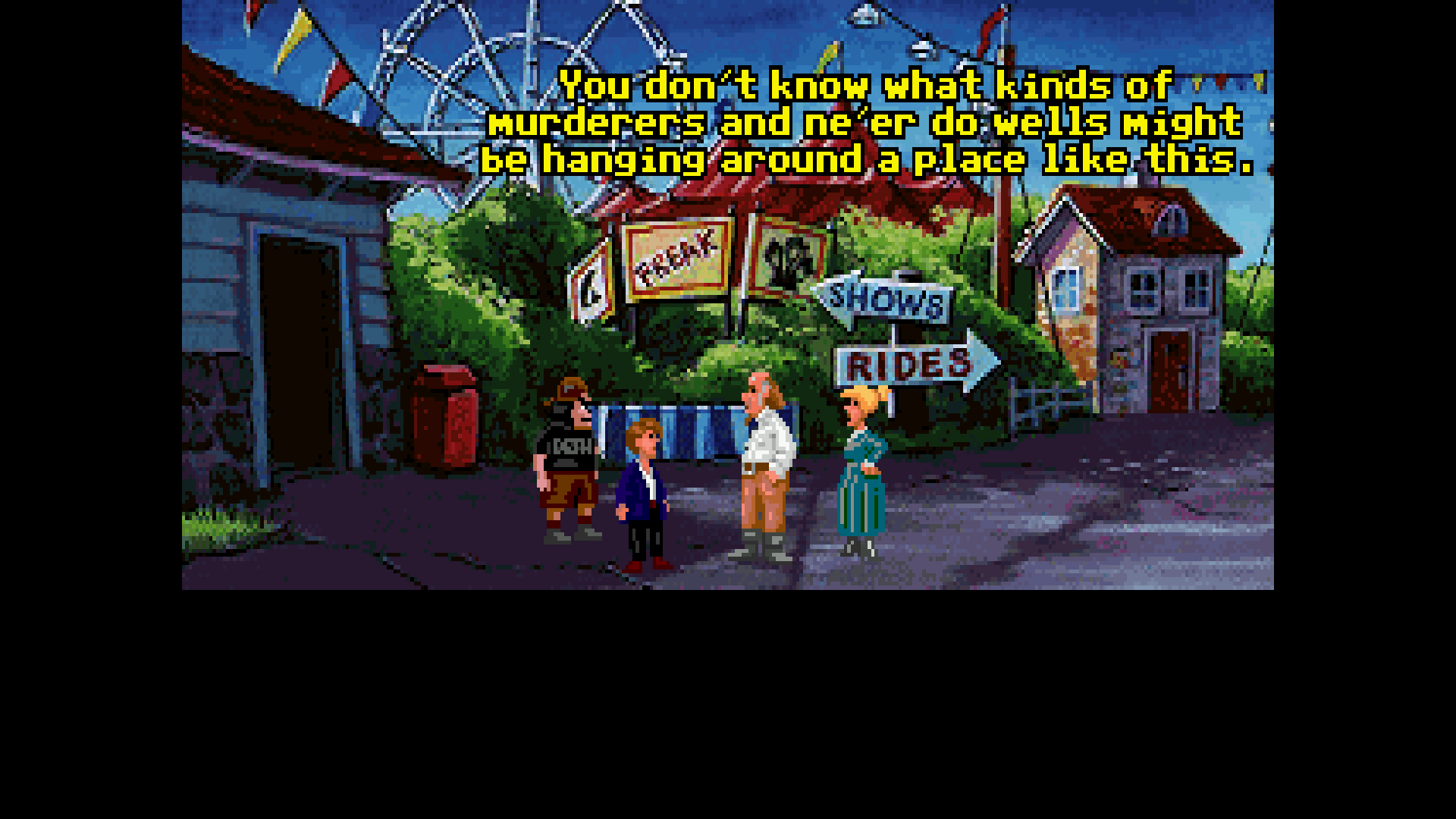
Though ranking the discrepancies by severity would be beside the point, perhaps the most regrettable change is the removal of a vertical scrolling effect that appeared twice in the game: when Guybrush peers over the Booty Island cliff face and when he dives to the ocean floor for the Mad Monkey figurehead. In Classic Mode of the special edition, those moments play out simply by performing a hard cut from one part of the specially-made background art to another, treating them as separate screens. Below are comparison videos showing just how severely these scenes have been harmed:
This is a curious one, leading one to ponder if there was some untoward technical reason why the effect couldn’t be reproduced. It’s been pointed out that odd workarounds were resorted to in historical ports of LeChuck’s Revenge, suggesting perhaps that the original effect was pulled off in some hacky, hardware-dependent way that presented a problem when porting over to another operating system. On the other hand, the ScummVM folks were able to make it work, so why not the studio that possessed the danged source code? The omission is all the more egregious considering Ron makes a point of highlighting the hard-won effect in the special edition’s developer commentary, seemingly oblivious to the fact that he’s singing the praises of a feature that was undone.
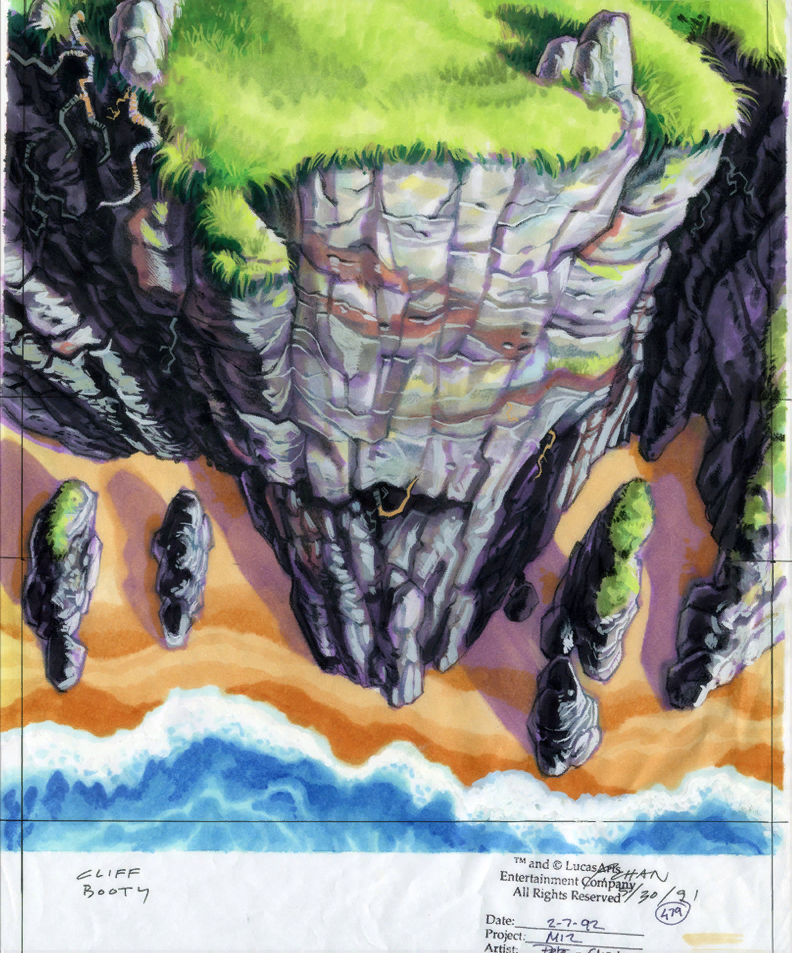
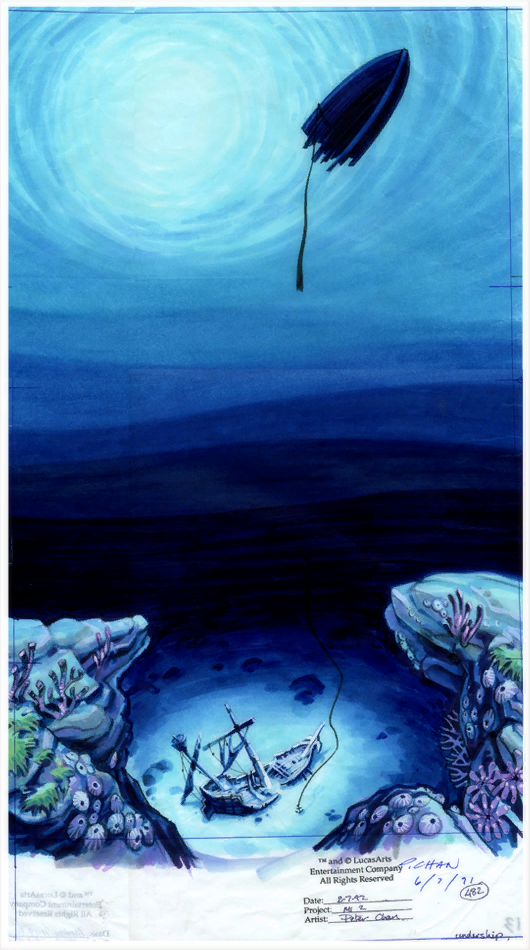
Pictured above: the original background art for the vertical scrolling scenes. Don't tell Peter Chan he just drew these for the laughs. :~
In fairness, I can’t rag on the special editions about all this stuff without pointing out that this isn’t the first time revisionism has carried the day. If you wanna get technical, the 16-color version of The Secret of Monkey Island is the true original, and yet the 256-color makeover (first on floppy, then on CD – the latter coming with its own little amendments) was pretty much all LucasArts kept in circulation for the better part of twenty years. By the time the special editions were made, no version of the games was commercially available, so it was hard not to be grateful that LucasArts was finally bringing these classics back into the consciousness in some form. (We “hardcores” might actually be more charitable in this sense than Ron Gilbert himself, who opined that the Classic Mode feature – even if it truly had been what was advertised – is a bit like justifying the colorization of a black-and-white movie by offering the original as an option.)
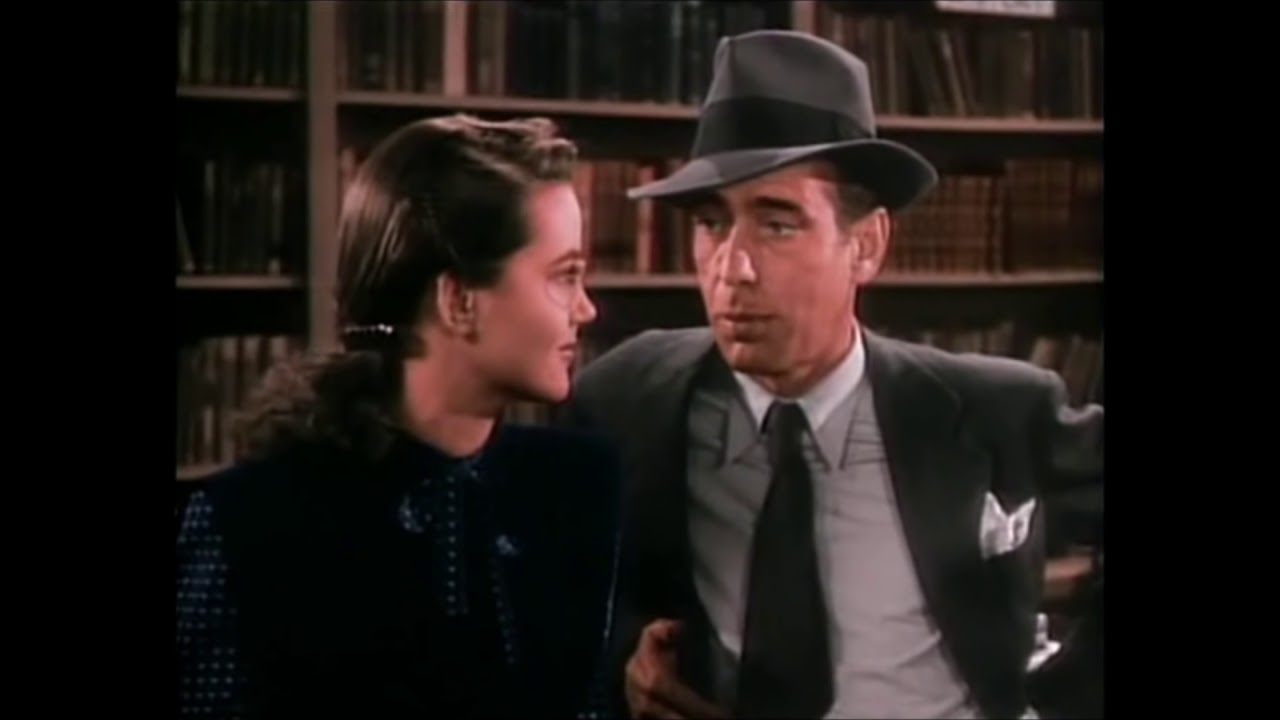
A problem is no less critical for being precedented. Bit by bit, these quiet alterations, compromises and imperfections bring the games further and further away from what they were. And when something is universally acknowledged as a classic, is its accurate preservation really a negligible point? (If we were talking about, say, Casablanca, none of this would be stood for, but the memory of old games seems uniquely dependent on active diligence.) Faulty custodianship isn’t exclusively borne out of carelessness, but it serves to highlight the importance of choice.
The special editions of the first two Monkey Island games are the sole way of legally obtaining these games. What would it have cost Lucasfilm to offer various "you're on your own" legacy builds alongside? Eleven seconds? Measured in spoonfuls of megabytes, these could have been unceremoniously tossed into a loose folder (as the FM-Towns version of Zak McKracken is on Steam, without context or advertisement) as part of the installation of the special editions or even offered standalone (as Maniac Mansion is, despite also being bundled inside Day of the Tentacle as an Easter egg). Considering how avoidable the situation, it is similarly nonsensical that the VGA Talkie version of Loom, considered by its creator to be “an abomination”, is the only form of the game anyone can own. There may be explanations for this all-over-the-place approach to curation beyond plain sloppiness, but I don't know how credible they are.
The special editions are a decade old now, but the appeal to common sense for access to legacy builds is one worth renewing in the midst of a new Monkey Island game and in the wake of Aaron Giles’ DREAMM, an emulator specific to the SCUMM games that offers the option of running them “as-is” for Windows users. The problem? You cannot actually buy them “as-is” anymore. The special editions and remasters supplant their originals altogether, while the balance of the catalog is sold bundled with ScummVM -- and since ScummVM replaces the original executables, customers don’t even get the courtesy of a complete fileset when they buy these games, denied the emulation option because someone knew better than them what they “needed” with their purchase. The only legal option for someone wanting to run the games natively is to get their hands on fragile old diskettes. That's like having to procure your own 35mm print of a movie to see the theatrical cut.
Necessity has made the fans themselves the ultimate custodians of these titles over the years. The great irony of ScummVM, considering the official use to which it’s put now, is that it was created in the early 2000s to fulfill a need that LucasArts itself couldn’t be bothered to, even when they all but had a solution in their hands. But if it’s ironic for Lucasfilm to leave their legacy game support to hobbyists, it’s downright delinquent that they won’t do the bare minimum to make the titles available in all their original forms. Even if players are on their own so far as getting them up and running (their options there, thankfully, have never been more legion), why should it be an extra-legal activity to get the builds, untouched and unabridged?
Though I acknowledge that game preservation is exponentially more complicated an endeavor than film preservation, because games in many ways are tied to the machine architecture they were built on and targeted for, I don’t think it’s some sort of demented purism (he said, constructing a strawman) to point out that the original work is either available or it is not. As long as the answer to perfectly legitimate questions remains, “Check to see if Archive.org has it,” the property owner is falling short. Lucasfilm is the steward of some beloved and important titles. Historically, they can need a little help remembering it.
A rant by Jason, who will quote EMI(*) all day long.
